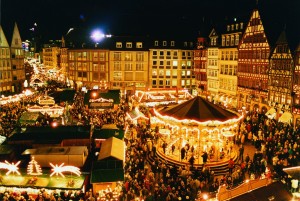TRADITIONS
The carnival Carnival in Cologne this festivity is carried out especially in the German regions where most of its residents are Roman Catholics, and Rhineland. The carnival ( "Fasching", "Fasnacht" or "Karneval") is a celebration that dates back to ancient times, particularly in the cities of Cologne, Bonn, Mainz and Dusseldorf. In the southern region of Germany, the Fastnet Alemannic is typical that the celebration starts on 11 November (the fifth season of the year), culminating on Ash Wednesday. The "Monday carnival" are carried out endless parades through the streets, where people not only attends disguised with typical or traditional clothes but also with funny costumes. This is an old custom to expel the winter.

Fairs (Kirchweih or Kirmes) The fairs are carried out in Germany at the time of the spring until the autumn, some during the weekends only, while others remain open throughout the week in the fairgrounds or in the downtown areas of cities. There are many fast food posts where you can enjoy snacks and sweets in addition to typical positions, shooting galleries, trains of terror, roller coasters and live music shows that are performed in tents or scenarios designed for the purpose. The Kirchweih or Kirmes has religious origin and are formerly carried out on the occasion of the consecration of a Christian church. This festivity acquires special relevance is the rural areas, where parades are organized and performed a traditional ceremony that consists of planting the Kirchweihbaum (tree of the Kirchweih).
Wine festivals in the nearby regions of the Rhine and the Moselle, more precisely in Baden and the Palatinate and on the banks of the River Main, are conducted between the months of May and November, the wine festivals and wine , in which the various cooperatives and their representatives, escancian his wine on posts mounted in public places, also offering the specialties of the region, with many live music and culminating with the crowning of the queen of the wine.
Christmas Markets Christmas Market in Römerberg, Frankfurt Christmas Market in Römerberg, Frankfurt Many are the cities of Germany that celebrate the Christmas markets between the months of November and December and some even until the day of kings. There you can visit the large amount of posts in which you can purchase Christmas decorations, jewelry, candles, toys and many more products and to taste a good wine with hot spices (mulled wine), chestnuts, spicy bread and toasted almonds.







